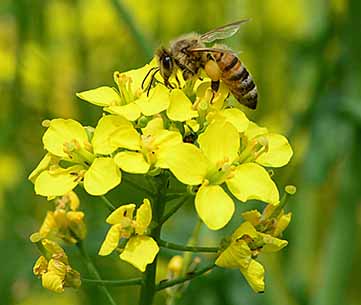MILLIONS of bees trucked into Victoria to pollinate almond plantations during August are now working their magic to help boost Victoria’s spring canola crops.
Victoria’s chief plant health officer, Gabrielle Vivian-Smith, said the bees were now moving on to help Victorian farmers produce an estimated $260 million worth of canola.
“The honey bee industry provides benefits of between $4-6 billion to the Australian economy each year, and specifically to pollination-dependent plant industries such as almonds, cherries and pome fruit across Australia each year,” she said.
“While canola is self-pollinating, the additional pollination it receives from bees boosts production considerably, and in return, the canola provides bees with food over winter and into their early spring breeding season.”
Dr Vivian-Smith said bees played a vital role in Victorian agriculture, with more than 40 per cent of the state’s food crops relying on the pollination services that bees provide.
“When most people think of bees, they think of honey, but without bees many other forms of food production would also be reduced,” she said.
Dr Vivian-Smith said canola production was now the largest oilseed crop, representing well over half of Australian oilseed production in the past five years, while cottonseed comprised around a third.
“Canola is grown for its seed which is crushed for the oil (mono and polyunsaturated) and used in margarine, cooking oils, salad oils and edible oil blends,” she said.
“After the oil is extracted, the by-product is a protein-rich meal which is also used by the intensive livestock industry.”
From July 2015 to April 2016, 1.7 million tonnes of Australian canola were shipped to the European Union, an increase of 76 per cent on the same period in the previous year.
Increased exports to the European Union have been supported by higher European Union import demand and lower exportable supplies of rapeseed from the Ukraine.
Dr Vivian-Smith said it was important that all Victorians, not just producers, took bee biosecurity and other biosecurity matters seriously, as international and domestic markets depend on our produce being free of contaminants.
“Everybody has a role to play in ensuring that pests and disease aren’t spread inadvertently through their actions, either at home or during travel.”
Source: Agriculture Victoria


HAVE YOUR SAY